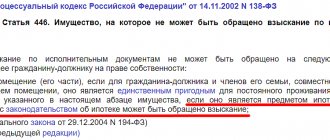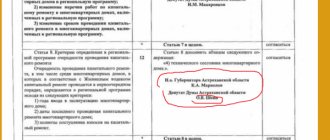According to the norms of the Housing Code of the Russian Federation, every owner or responsible tenant of housing is obliged to pay on time for the supplied utilities and services provided. In fact, the problem of debt is very relevant; generating and management companies, housing and communal services are faced with a total of huge amounts of debt from the population. There may be many reasons for this, but no matter how high the tariffs are, or whether the services are of high quality, until there is a court decision, citizens are required to pay on receipts. Only after they have appealed the debt and the expediency of the demands is justified can we talk about recalculation.
Repayment of debt is the interest of not only management and resource supply companies, but also of the debtors themselves. Lists of defaulters are formed regularly in order to warn
debtors that the next step will be to hold them accountable if the debt is not repaid at least partially.
Housing Code Article 155 establishes that payments for utilities must be made every month before the tenth day. You can find out about the debt from management companies, from the notification receipt received and from the structural unit of the provider of each service.
Who is responsible?
Article 153 of the same Housing Code states that every owner of real estate or a tenant who is entrusted with a certain responsibility is obliged to pay for the provision of utility services in full and on time.
Dear readers!
Our articles talk about typical ways to resolve legal issues, but each case is unique. If you want to find out how to solve your specific problem, please contact the online consultant form on the right →
It's fast and free!
Or call us by phone (24/7):
If you want to find out how to solve your particular problem, call us by phone. It's fast and free!
+7 Moscow,
Moscow region
+7 Saint Petersburg,
Leningrad region
+7 Regions
(the call is free for all regions of Russia)
Who is responsible for payment:
- The owner of the immovable property (if there are several of them, the responsibility is shared among everyone);
- Tenants and lessees of real estate as a result of the conclusion of a formal agreement;
- Tenants under a social tenancy agreement;
- Members of housing cooperatives.
For late payment or non-payment at all when consuming supplied resources, you will have to bear responsibility in accordance with the current acts of Russian legislation. This issue is regulated by:
- Civil Code of the Russian Federation (Article 25);
- Government regulations regarding the provision of public services;
- Other legislative acts.
For non-payment, they have the right to suspend the supply of electricity or other resource, as well as limit the volume of supply. Violators can also expect penalties, penalties, lawsuits, seizure of property, termination of the contract with the municipality, and in some cases, even eviction and sale of housing at auction.
Who shouldn't be afraid of eviction?
Not all debtors can be evicted by law with the subsequent sale of their property. Thus, referring to Article 446 of the Civil Procedure Code of the Russian Federation, it is impossible to seize an apartment from a citizen who has this only home. In addition, they do not have the right to repossess housing taken on a mortgage if it has not yet been fully paid.
The Housing Code, Article 90, also states that a tenant cannot be evicted if the debt has valid reasons. These include:
- Young children and disabled people who are fully supported by the debtor;
- Illness of responsible tenants with hospitalization;
- Delay in payment of wages or pensions.
When it comes to debtors living in an apartment under a social tenancy agreement, municipal authorities have the right to evict them if the debt is not repaid within six months. However, no other housing will be provided in return. In general, the list of paid utilities consists of the operation, maintenance and repair of housing, services of a management company or housing and communal services, electricity, water supply, drainage, heating, gas, elevator maintenance and cleaning of the local area.
How can I see the lists?
Each debtor for utilities, as well as a list of similar defaulters, can now be seen in the public domain, since it is public.
This decision is due to the fact that in apartment buildings there is always property of common ownership and use, and publicizing the debtors with the amount of their debt can contribute to a speedy resolution of the issue. Since the common property of a home does not belong to any one person, therefore, all residents are required to pay for its maintenance. This means that the fee is distributed among everyone, and if one of the residents fails to pay, everyone will suffer, even those who always pay on time and in full. The lists are periodically posted in printed form on the bulletin boards of each apartment building. They are also available in the office of the management company or housing and communal services, published in local media and posted on official government websites online. Obtaining information about debtors via the Internet is a very convenient way, available at any convenient time and completely free of charge. Almost all management companies have their own websites, where lists of debtors are posted.
What are management companies guided by?
However, sometimes the actions of the management company cause fierce criticism. Some citizens believe that by publicly displaying the debtor's data and the amount of his debt, companies are violating the law on personal data.
In their justification, management companies refer to Article 153 of the Housing Code of the Russian Federation, which states that individuals and organizations must promptly and fully ensure payment for utilities and residential premises.
Companies also note that when placing advertisements they often indicate not the name of the defaulter, but only the number of his apartment. Based on the apartment number, it is impossible to understand with absolute accuracy who exactly the debtor is, since different people may live in the premises, including those who are not registered in this living space.
Suppression by sanctions
Penalties for defaulters for the provision of utility services are calculated in accordance with current Russian legislation.
Unlike standard fines that are issued to violators, in this case penalties and penalties are applied. In addition to financial pressure, other measures are also used on defaulters, for example, restriction and disconnection from communication systems, seizure, and eviction.
The amount of monetary sanctions is determined by Article 155 of the Housing Code of the Russian Federation, paragraph 14. It states that the penalty is 1/300 of the central bank's refinanced rate. The fine will be calculated to the debtor daily, for each day of delay in payment. Thus, the amount of the penalty is calculated using the standard formula, where the number of days of delay is multiplied by the refinancing rate divided by three hundred.
Termination of the provision of public services partially or completely is also legal, as can be seen by paying attention to government decree No. 354. Before any action is taken, the debtor must be notified in writing one month in advance.
Eviction and court
As already mentioned, they cannot evict a defaulter from his living space if he has no other housing.
If there are good reasons for non-payment and late payments, and payments have not been paid for six months, the debtor may be sued. Without a court decision, eviction is impossible. Every citizen has the legal right to appeal a court decision, which must take place in a certain manner established by law. Going to court is the last way to influence the defaulter. The management company, housing and communal services, or any of the companies that supplies a certain resource can file a claim. The task of the court is to impartially consider the arguments of both sides, after which the decision may be as follows:
- Establishing a limited time frame for the defaulter within which the debt must be repaid;
- A decree according to which the debtor will be evicted and his property will be sold at auction;
- Seizure of an immovable object;
- Deciding on other measures depending on the individual circumstances of the case.
The debt is recovered from the amount of sale of the seized property. The decision is appealed through the appellate court.
The entrances will be cleared of debtors. What Roskomnadzor said
Last week, Roskomnadzor officially declared illegal the actions of management companies to post lists of debtors with names and addresses in the entrances. The department considered that such a measure to increase payment discipline was contrary to the Law “On Personal Data”. Experts confirmed to DOLG.RF the illegality of posting information about personal data of debtors and suggested other ways to notify about debts and stimulate the growth of their collection.
Not all legal measures to increase payment discipline turn out to be effective, just as not all effective means are legal, noted Anton Bibarov-Gosudarev, head of the Office of the Tambov regional branch of the Russian Bar Association.
Even in Soviet times, the institution of public censure made it possible to put in place an employee or a tenant from a neighboring entrance who had committed a crime, so the motives of housing and communal services organizations in this situation are obvious. Management companies still use the method of public reprimand as one of the most effective for attracting persistent defaulters to repay their debt for housing and communal services.
This method does have obvious results: some are surprised by the amount of debt, some are surprised by the discussion of debtors among their neighbors, but not everyone is interested in public opinion. Companies that, in carrying out their activities, need to collect personal data of their own clients are obliged to ensure their non-distribution, emphasized Elena Balakhonova, lawyer at Mariox Center LLC. Otherwise, administrative sanctions will be applied to persons who violate the requirements of the law, and customer trust will be lost.
Placing lists of debtors with a full list of their personal data (full name, address, amount of debt, telephone number) on information stands is illegal. There is no direct prohibition of these actions in the law, but in this case the norms of the legislation on personal data are violated.
“The way out of the situation is simple,” says Elena Balakhonova, “to reclassify the measure from a negative one to an informational one, that is, to completely depersonalize all data on debts, not to tie them to a specific person, so that it is impossible to understand who we are talking about.”
Instead of indicating your full name, you can simply indicate the number of the apartment in which the debtor lives, or the login from your personal account, if you have one, or the number of your personal account for payment of housing and communal services. Such data in people’s minds is not tied to a specific person; each debtor will be able to independently identify himself.
Payment discipline largely depends on the material well-being of citizens, Anton Bibarov-Gosudarev is sure. Obviously, for some, problems with utility debts stem from low income or unforeseen circumstances: illness, job loss. It’s another matter if people become defaulters due to some kind of their own convictions or banal irresponsibility. Here it is necessary to use legal methods - going to court with subsequent indexation of debt in case of failure to pay on time.
Noticeable improvements can be achieved through personal conversations with debtors, Elena Balakhonova is sure. During the conversation, you can find out the reason for the debtor’s non-payment, explain the consequences (disconnection of services, filing a claim in court, seizure of bank accounts, seizure of property, etc.). You can suggest possible solutions: applying for a loan, subsidies, the possibility of paying off debt in installments.
If a company violates the Personal Data Law, it can be held liable in accordance with Article 13.11 of the Code of Administrative Offenses of the Russian Federation. Today the maximum fine for a legal entity is 75 thousand rubles.
“The subjects of personal data themselves, who have suffered from their publication, can independently go to court with a demand to declare such placement illegal and compensate for moral damage. It’s true that in Russia, judicial practice on such disputes is just beginning to take shape,” explained Anton Bibarov-Gosudarev.
Example of a sequence of actions
The management company, housing and communal services or homeowners' association have the right to take appropriate measures that will be aimed at the irresponsibility of debtors. Having their lists in the public domain, it will not be difficult to address this issue at any time. To influence the defaulter, a number of sequential actions are carried out, namely:
- Establishment and confirmation of the fact and amount of debt for the last few months;
- Sending a written official notice to the debtor with the amount of the debt and the requirement to repay it (must be delivered in person);
- If we are talking about disconnecting any resource, a month before this it is necessary to inform the defaulter, informing about the consequences of ignoring the notification (payment must be either full or partial);
- If the notification is ignored, a secondary notification is sent, after which the promised sanctions are implemented within three business days.
If the responsible authorities apply their sanctions without notification, this is a violation, even though the debtor really is such. By turning to lawyers for help, you can appear not as a violator, but as a victim, but this will not free you from paying off the debt.
Roskomnadzor considered lists of debtors in entrances illegal
Roskomnadzor called the posting of debtor lists in hallways by management companies a violation of the Personal Data Law. According to the department’s statistics, 10% of the complaints received by Russians concern housing and communal services
Photo: Anton Belitsky / Kommersant
Posting lists of debtors indicating their full name or address is a violation of the Law “On Personal Data”, which leads to administrative liability. This was announced by Alfiya Gafurova, Deputy Head of the Department for the Protection of the Rights of Personal Data Subjects of Roskomnadzor, speaking at a seminar for personal data operators (held in online format). According to her, the department “quite often” receives complaints from citizens about the placement of such lists in the entrances of residential buildings.
Gafurova clarified that information about the amount of debt of the tenant, together with the full name or mention of the full address of the debtor’s place of residence, are considered personal data. Their publication in hallways, on the company’s official website and in the media without the consent of the debtor is an offense. At the same time, she noted that the lists can indicate the amount of debt along with the tenant’s apartment number or his personal account number. As Yuri Kontemirov, head of the department for the protection of the rights of subjects of personal data of Roskomnadzor, also explained at the seminar, the full address of a person’s place of residence belongs to the category of information about the place of residence, and its publication in the lists of debtors requires the consent of the person, “even if there is no full name there, even if there are several owners, in which case this information indirectly relates to each owner of this premises.”
Most Russians allowed the collection of personal data to combat COVID Technologies and media
He also emphasized that the data on the resident’s personal account and apartment number does not relate to the subject of the personal data, but to the residential premises itself, and in this case, consent from the debtor is not required. Kontemirov also said that despite the fact that the legislation on personal data has been in force for 13 years, “there is still a misunderstanding” what to classify as such.
To solve this problem, in the first half of 2021, specialists will complete work on a “personal data matrix,” which the department plans to make publicly available. He clarified that, for example, TIN, SNILS and email, even without additional information, are personal data, since these identifiers are unique and assigned to a specific individual. At the same time, the MAC address (a unique number that is assigned to a smartphone, computer, router, and other equipment at the production stage) in itself does not relate to information about the subscriber, but as soon as it begins to be enriched with other information - geolocation, operating system, cookies - files or phone number, they “are included in the scope of personal data.”
How to leave the list?
When everything is formalized and carried out according to the law, with notifications being sent and deadlines being met, in order to get off the lists of debtors, the following actions should be taken:
- Pay off the debt. If this is not possible due to financial difficulties, you must write a statement requesting a deferment of payment. The law does not allow denying a citizen the right to do this;
- Once the deferment is approved, an official document will be issued confirming this. You need to come with it to the management company or other responsible body. However, despite the deferment, you will still need to pay a certain part of the amount immediately. Usually it is about a thousand rubles;
- Further actions will depend on the nature of the sanctions imposed.
In cases where sanctions involving disconnection of a utility resource were carried out with violations, this must be reported to the prosecutor's office. A special commission will be appointed there, whose task is to verify the authenticity of the complaint and make an appropriate decision.
What are the consequences of failing to pay utility bills?
If a citizen was unable to fulfill his obligations to pay the debt for utility services, then the utility companies try to resolve the problem peacefully. The debtor is usually sent various notices.
If a citizen does not repay the debt within 3-6 months, the company goes to court. The court sides with the utility companies and gives the debtor time to voluntarily repay the debt.
If the citizen does not comply with this decision within 10 days, then the company has the right to transfer information about the debt to the credit history bureau. This will be a strong blow to the citizen’s debt reputation. The next time he wants to take a cash loan from a bank or online loans from an MFO, few lenders will agree to cooperate with him.
And the debtor’s problems will not end there. It will be handled by bailiffs who will check deposits and savings in banks, the availability of movable and immovable property, and the salary income of the defaulter. The debtor may also be prohibited from traveling abroad.




